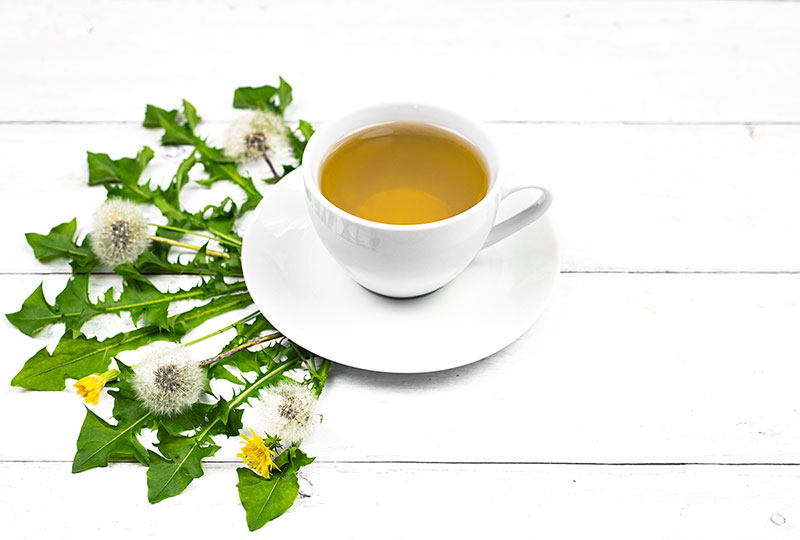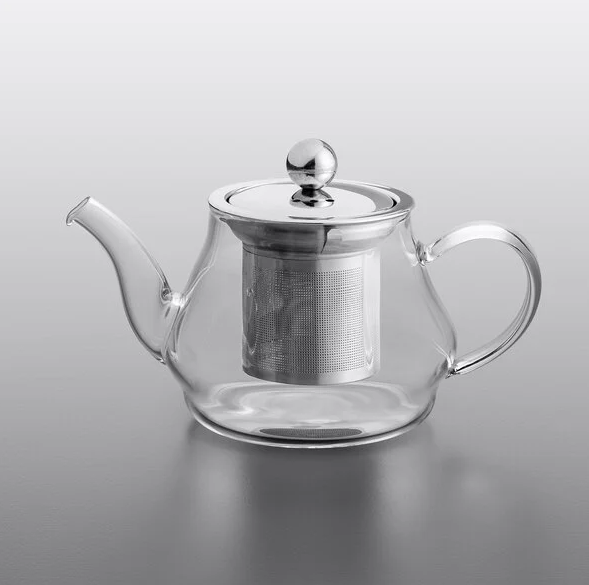How to Make Dandelion Tea
This post may contain affiliate links. Simple Loose Leaf is a participant in the Amazon Associates Program, an affiliate advertising program designed to provide a means for sites to earn advertising fees by linking to Amazon.com. Dandelions not only look pretty, they make a great cup of tea too. Dandelion tea is one of those teas you can easily make at home from freshly picked or dried dandelions. But not only flowers are used for making tea. Dandelion root, leaves and flowers can all be used for making tea, and all of them may provide some benefits.
What is dandelion tea?
Dandelion tea is a herbal caffeine free tea made from flowers, leaves or the root of dandelion plants in the daisy family or Taraxacum officinale. It’s been used in different traditional medicines for over a thousand years[1]. They are mostly used for liver detox, kidney and digestive problems, toothaches, and even lethargy and depression[2]. Dandelions are widely available, which makes them a very attractive homemade remedy. They are mostly considered a weed, and thus often found growing wild in unpolluted places. Dandelion flowers and leaves are used for eating too. For example, dandelion leaf salad is considered a true delicacy in some countries. Flower can be eaten raw, steamed or even fried in batter. Roasted dandelion root is often used as a caffeine free coffee substitute.How to Make Dandelion Tea
Any part of dandelion plant can be used for making tea - flowers, root or leaves. Dandelion root tea, dandelion flower tea and dandelion leaf tea are all commercially available, but you can make them by yourself too. For making dandelion flower tea, pick young flowers or either dry them or use fresh. For making dandelion leaf tea, harvest young tea leaves and dry them. Older tea leaves may be very bitter. For making dandelion root tea, harvest root after the summer, wash, chop and dry them. If you want to use roasted dandelion root for either tea or dandelion coffee, roast fresh or dry roots in the oven. Dandelion roots look like a darker thin parsley root. Root of fresh dandelions can be used too. Dandelion flower tea will have the most delicate and sweet flavor, whilst the roasted root tea is more robust, deep and roasted. It’s often used as a coffee replacement. You can make tea from each part of dandelion separately or blend them together. Dandelion leaf and flower can be blended with other ingredients too.How much dandelion root do you need?
Use about two teaspoons of dandelion root per cup of water. Bring water to a boil, add dandelion root, and simmer for a few minutes. Remove from fire and steep for additional 15 minutes. Studies suggest the dose should be 4 to 10 grams of root per day divided into small doses[3].How much dandelion leaf do you need?
To make dandelion leaf tea, use about 1 teaspoon of dried leaves. Crushed dandelion leaves look very similar to dry mint tea. Full uncrushed dried dandelion leaves are available too. Steep for about 10 minutes in boiling water.How much dandelion flower do you need?
To make dandelion flower tea, use about half a cup of dandelion flowers or about 10-15 flower heads. Steep in hot water for 15-20 minutes.
Health Benefits of Dandelion Tea
All parts of the dandelion plant may provide numerous health benefits, but the most beneficial parts may be the leaf and the root[4]. Dandelion flowers may provide antioxidant activity, while the leaves and roots are often used for urinary and digestive problems[5]. However, although this plant has been used for thousands of years, studies yet need to confirm many of the potential benefits. Studies showed that dandelion tea is likely to be very safe to use, with no adverse side effects ever been reported[6]. Allergic reactions to dandelion are possible, but very rare[7]. Interactions with some medication in possible too.1. Liver support
Dandelion has been used for treating many disorders in traditional medicines for years. Dandelion leaf tea has anti-inflammatory properties and may help with both liver and gallbladder problems. It’s believed it can help with jaundice, hepatitis and liver detox. Current studied suggest dandelion is safe to use for liver disorders, but not much is known about the actual benefits on the liver[8].2. Digestion
Dandelion is often used for treating gastrointestinal problems. Studies showed that dandelion combined with other herbs, it may greatly reduce symptoms of chronic colitis[9] and may help with upset stomach[10]. Leaves can also be used for increasing the appetite.[11]3. Fighting cancer
Dandelion leaf and root may have a potential in fighting different cancers by killing cancer cells[12]. However, more research is needed to know how dandelion root may actually help.4. Benefits for the urinary tract
Studies showed that dandelion leaf may be helpful in treating urinary tract infections caused by bacteria, especially against Gram-positive bacteria[13]. Moreover, dandelion leaf may help with fluid retention[14].5. Anti-diabetic properties
Studies suggest that dandelion root may help stabilise blood sugar levels and help manage type 2 diabetes,[15] lower bad cholesterol and tryglicerides[16].Tips to Make Your Tea Taste Good
Dandelion tea can have a different flavor, depending on which part of the plant you are using. Leaves can be bitter if harvested too late. To make your tea taste better, pay attention to water type, quality of dandelion flowers/leaves/root, steeping time and temperature and how much flowers/leaves/root you are using. Dandelion has always been an important part of many traditional medicines, there are many ways you can prepare it and many dandelion tea recipes. Therefore, to get the best benefits, always steep tea as instructed on the packaging or as advised by your healthcare provider. Another way of enhancing the flavor is by adding honey, sugar or other sweeteners. Dandelion root tea can be made with milk and coconut oil and used as a replacement for your morning cup of coffee.Disclaimer: This article is for informational purposes only. It’s not intended to replace medical advice, diagnosis or treatment. Every person is different and may react to different herbs and teas differently. Never use teas or herbs to treat serious medical conditions on your own. Always seek professional medical advice before choosing home remedies.
References:
[1] http://www.columbia.edu/itc/cerc/danoff-burg/invasion_bio/inv_spp_summ/Taraxum_officinale.htm [2] https://www.mofga.org/Publications/The-Maine-Organic-Farmer-Gardener/Summer-2007/Ten-Things-You-Might-Not-Know-About-Dandelions [3] https://www.researchgate.net/publication/237759417_Dandelion_Taraxacum_officinale_and_T_mongolicum [4] https://www.researchgate.net/publication/333811877_Literature_Review_on_The_Biological_Effects_of_Taraxacum_officinale_Plant_In_Therapy [5] http://pennstatehershey.adam.com/content.aspx?productid=107&pid=33&gid=000236 [6] https://www.researchgate.net/publication/333811877_Literature_Review_on_The_Biological_Effects_of_Taraxacum_officinale_Plant_In_Therapy [7] https://www.researchgate.net/publication/237759417_Dandelion_Taraxacum_officinale_and_T_mongolicum [8] https://www.researchgate.net/publication/302959005_Hepatoprotective_properties_of_Dandelion_Recent_update [9] https://www.researchgate.net/publication/237759417_Dandelion_Taraxacum_officinale_and_T_mongolicum [10]http://pennstatehershey.adam.com/content.aspx?productid=107&pid=33&gid=000236 [11]http://pennstatehershey.adam.com/content.aspx?productid=107&pid=33&gid=000236 [12] https://www.researchgate.net/publication/333811877_Literature_Review_on_The_Biological_Effects_of_Taraxacum_officinale_Plant_In_Therapy [13] https://www.hindawi.com/journals/ecam/2018/2706417/ [14] https://www.researchgate.net/publication/333811877_Literature_Review_on_The_Biological_Effects_of_Taraxacum_officinale_Plant_In_Therapy [15] https://www.ncbi.nlm.nih.gov/pmc/articles/PMC5553762/ [16] http://pennstatehershey.adam.com/content.aspx?productid=107&pid=33&gid=000236
More from:
SLL




Leave a comment